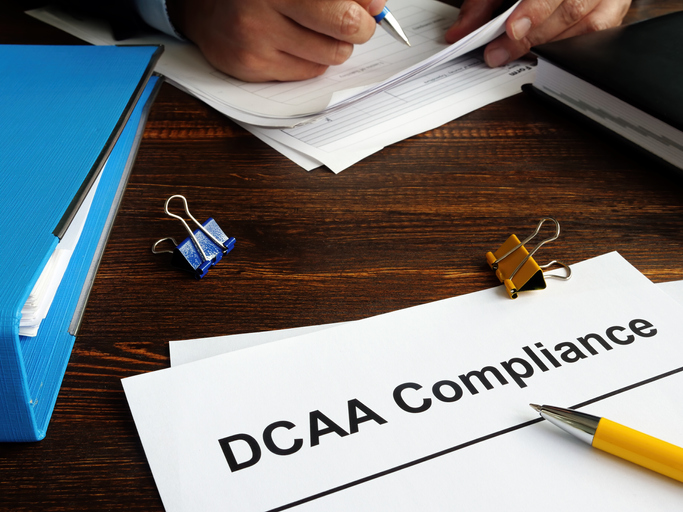What is DCAA Compliance?
Author's Note: Originally posted on the Small GovCon CFO blog on March 9, 2023.
If you ask me, "DCAA compliance" is just a buzz word. The term is meant to describe the requirement for government contractors to have an accounting system which is compliant with GAAP, the FAR, DFARS (if you are a defense contractor), CAS and other applicable regulations. Compliance is determined following an audit by the DCAA, or the Defense Contract Audit Agency. As a government contractor, you must have an adequate accounting system to be awarded a cost-type contract–but you should have one for all other contract types (FFP, T&M, etc.) You must be DCAA compliant to be successful as a government contractor.
When a client asks the question, "What is DCAA compliance?" I encourage them to read the DCAA publication Information for Contractors (DCAA Manual No. 7641.90, June 26, 2012). I do this for a couple of reasons. First, it's sort of required reading for government contractors. DCAA auditors will want to know if you have read it. Second, clients quickly realize they will want professional guidance on their journey. Soon though, I'll just refer them to ChatGPT:
DCAA stands for Defense Contract Audit Agency, which is a United States government agency responsible for performing contract audits for the Department of Defense and other federal agencies. DCAA compliance refers to the set of rules and regulations that companies doing business with the US government must follow to ensure that their financial and accounting practices are in accordance with the DCAA's requirements.
DCAA compliance involves ensuring that a company's financial and accounting systems are properly designed, documented, and maintained, and that they comply with generally accepted accounting principles (GAAP) and other applicable regulations. This includes ensuring that the company's books and records are accurate and complete, that costs are properly allocated and accounted for, that timekeeping and labor reporting systems are accurate, and that the company's internal controls are sufficient to prevent fraud, waste, and abuse.
Companies that are awarded contracts with the US government are typically subject to audits by the DCAA to ensure that they are in compliance with these requirements. Failure to comply with DCAA regulations can result in penalties, fines, and even loss of government contracts.
As the owner of a small business who is concerned with DCAA compliance, you should answer "yes" to these questions:
- Is my accounting system designed correctly?
- Is my accounting system documented?
- Is my accounting system maintained?
You design your accounting system correctly by following the criteria on SF-1408. For example: Financial reporting should be in accordance with GAAP. Direct and indirect costs should be properly accounted for (by CLIN if necessary), and unallowable costs should be segregated from allowable. Indirect cost rates should be calculated and costs allocated. Timekeeping and labor distribution should track employee efforts by the project/task they work on. The books should be closed monthly and reviewed by management.
You document your accounting system by writing accounting policies and procedures which are tailored to your operations. Your accounting manual cannot be a fill in the blanks template. It should describe your general accounting policies, chart of accounts, indirect rate model, the software/tools you use for accounting, timekeeping, and payroll and the procedures followed using those. There should also be an attempt to provide for segregation of duties, as well. The bookkeeper, for example, should not be approving vendor bills, entering them into the accounting software, deciding which bills to pay and then sending bill payments to vendors. Instead, the bookkeeper should enter bills into the accounting system and could send bill payments. But the owner should approve vendors' bills and decide which ones should be paid.
Finally, you must maintain your accounting system. This requires the regular review of reports, updates when rules or standards change and other ongoing activities. The accounting manual is a good example of maintenance. It must be updated for changes in accounting standards, e.g., ASC 606 (Revenue Recognition) and ASC 842 (Leases). Your accounting manual should be the basis for DCAA compliance as it relates to your business. It should make compliance easier and be somewhat of a living document. It cannot be something that is created but then put away in a drawer and hardly used.
DCAA compliance is a process. It should be thought of as any other strategic goal and resources need to be dedicated toward its accomplishment and ongoing maintenance. Without an adequate accounting system, receiving federal awards will be nearly impossible. Even if you get an award, one day the auditors will come and you must be prepared. The best time to start with DCAA compliance is before you get your first contract, but any time is better than not at all.
Do you have questions about DCAA compliance? Schedule a free consultation today!
#govcon
Disclaimer: This information on this blog, including this blog post and any comments, are intended for general information only and provided to you “as is” without any representations or warranties, express or implied. Blogs can’t substitute for accounting, tax or legal advice specific to your situation which can only be obtained from consultation with a qualified professional.

